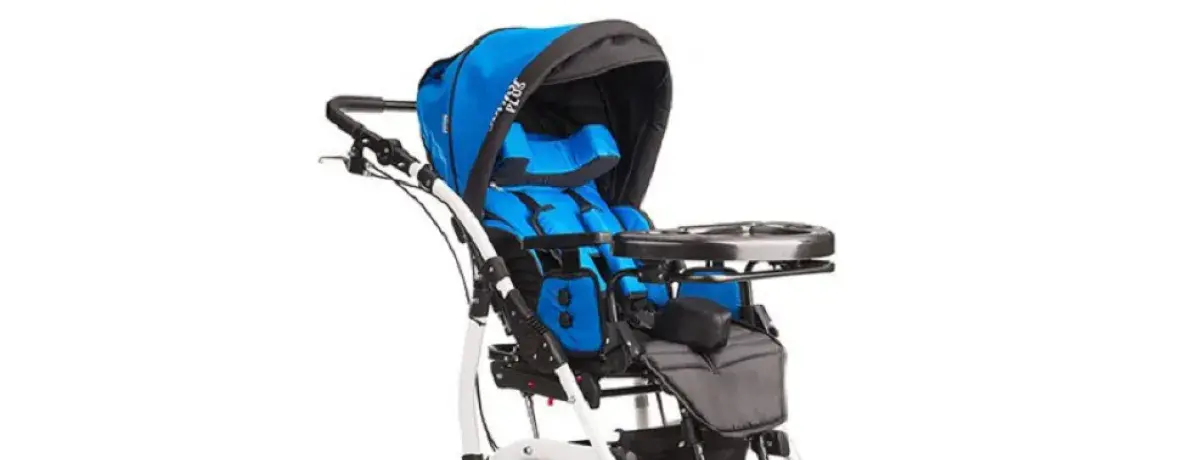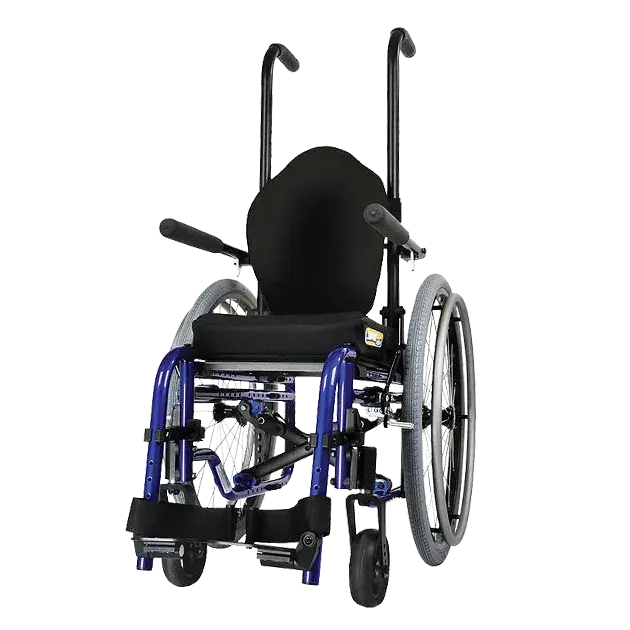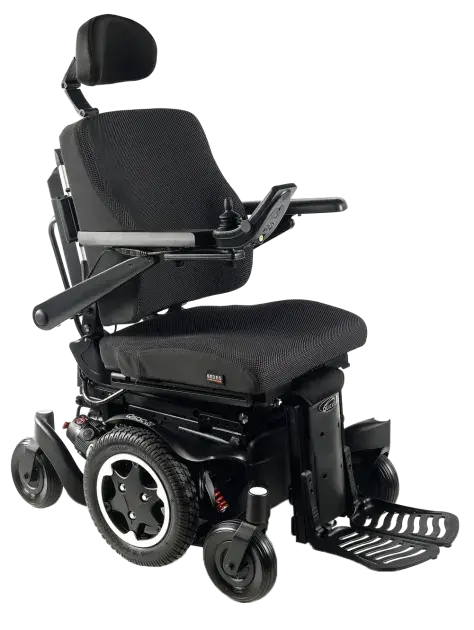
Are you neurologically challenged? Which child, and how much better is your child's quality of life?
When a child has a neurological condition that affects their mobility, finding the right stroller is a crucial decision for their well-being. Neurological strollers not only facilitate transportation and safety but also help improve posture, comfort, and overall quality of life. However, with so many options on the market, choosing the most suitable model can be a challenge.
It is important to consider various factors such as postural support, how well the stroller adapts to the child’s specific needs, ease of maneuverability for caregivers, and the durability of materials. Additionally, the stroller’s design and features should ensure proper weight distribution and body positioning, preventing discomfort or possible long-term health complications.
In this article, we’ll guide you step by step so you can make the best decision, ensuring your child has the comfort and support they need to move safely and participate actively in their surroundings. Discover how to choose the ideal neurological stroller and improve their quality of life!
We invite you to read: Discover the importance of early intervention in disability
What Is a Neurological Stroller?
A neurological stroller is a mobility device designed to provide postural support and safety for children with neurological conditions that affect their ability to move, control posture, and maintain stability. These strollers are specially designed to offer comfort and facilitate mobility for children who require additional support to sit and move safely.
Unlike conventional strollers, neurological strollers have special features that make them ideal for children with specific needs. Among their main components are:
Ergonomic seat and backrest: designed to provide proper spinal support and maintain a healthy posture.
Support and adjustment systems: such as safety harnesses and lateral supports that prevent sliding and provide stability.
Padded and breathable materials: ensuring the child’s comfort and preventing skin irritation.
Reclining and height adjustment options: allowing adaptation to the child’s individual needs and daily activities.
Durable wheels and safety brakes: ensuring safe movement on different surfaces.
Using a neurological stroller not only improves the child’s mobility but also promotes participation in daily activities and integration into family, school, and community environments. Moreover, these devices can be customized to meet each child’s specific needs, ensuring they receive the appropriate level of support for their well-being and development.
In many cases, the neurological stroller is part of a comprehensive rehabilitation and care plan in which occupational therapists, physiotherapists, and mobility specialists work together with families to ensure the child can move safely and comfortably.
Types of Neurological Strollers
There are different types of neurological strollers designed to meet each child’s specific needs. Below are some featured models that offer various levels of support and functionality:
1. Basic Neurological Stroller: EIO PUSH CHAIR
This model, manufactured by Special Tomato, is ideal for children with mild to moderate postural support needs. It is lightweight and easy to transport, making it an excellent option for short trips or occasional outings.
Reclinable backrest for greater comfort, even during naps.
Includes abduction system that enhances positioning and safety.
Possibility to add extra accessories for improved postural support.
It is important to note that this stroller is recommended for children with good head control, as otherwise it could cause discomfort or postural issues.
2. Neurological Stroller Soft-Touch Liners
This model, also from Special Tomato, focuses on children who have difficulty maintaining trunk control. Its versatile design allows it to be used on various surfaces, not just the stroller, providing greater flexibility for parents and caregivers.
Provides excellent postural support for children with limited trunk control.
Can be used in wheelchairs, regular chairs, or directly in the stroller.
Padded ergonomic material for increased comfort.
3. Neurological Stroller Voyage
The Voyage, developed by Sunrise Medical, is designed for children who cannot maintain proper body control. Its tilt system helps relieve pressure and improve posture, breathing, and digestion.
Reversible seat that allows the child to face their caregiver.
Adjustable tilt and recline functions for easier feeding and comfort.
Growth system suitable from infancy up to 4 years old.
Choosing the right neurological stroller depends on the child’s individual needs and the recommendation of a healthcare professional. The stroller must provide postural support, comfort, and safety, improving the child’s quality of life and easing caregivers’ tasks.
You might also be interested in: How to prevent obesity to avoid mobility limitations
When Is a Neurological Stroller Used?
Neurological strollers are designed to provide support and comfort for children with conditions that affect their motor, cognitive, or sensory development. Their use is recommended in various situations, depending on the child’s needs and the level of assistance required. Below are some common cases where their use is advised:
Neuromotor disorders: used for children with cerebral palsy, spina bifida, muscular dystrophy, or other disorders affecting postural control and movement. These strollers help maintain an upright posture, prevent musculoskeletal deformities, and provide stability.
Lack of head and trunk control: children unable to hold their head or control their trunk require a stroller with adequate postural support. Models like the Voyage by Sunrise Medical include tilt systems that enhance posture and facilitate breathing and digestion.
Sensory and cognitive disorders: for children with autism, psychomotor delay, or intellectual disabilities, a neurological stroller provides a safe and comfortable environment to prevent improper postures or involuntary movements.
Postoperative recovery: after orthopedic or neurological surgeries, some children need special support during recovery. A neurological stroller helps maintain proper positioning and reduces the risk of postoperative complications.
Mobility difficulties and muscle fatigue: for children who tire easily or have hypotonia, a neurological stroller allows mobility without overexerting muscles, preventing strain and injuries.
How to Choose the Best Neurological Stroller for Your Child
Choosing the right neurological stroller for your child is a key decision for their well-being and development. Every child has specific needs, so it’s important to consider several factors before deciding.
Level of support required: depending on the child’s postural control, choose a stroller that offers the right level of support. For children with moderate physical control, models like the EIO PUSH CHAIR are lightweight and functional. For greater stability, the Voyage by Sunrise Medical offers tilt and advanced postural adjustment.
Comfort and ergonomics: it’s essential that the stroller provides comfort for extended periods. Models with padded seats and adjustable systems help maintain proper posture without discomfort.
Adaptability and growth: some strollers feature growth systems that adjust as the child grows. This ensures long-term use and a smart investment.
Ease of transport and use: if the stroller will be used for frequent trips or outings, lightweight and foldable models like the EIO PUSH CHAIR are recommended.
Consult a specialist: a physiotherapist or occupational therapist should assess the child’s needs and recommend the most appropriate model. An incorrect fit may cause discomfort or long-term postural issues.
At Loh Medical, we understand the importance of finding the ideal neurological stroller for each child. That’s why we have a team of specialized physiotherapists who can help you choose the best model for your child.
If you’d like more information or wish to schedule an evaluation with our experts, contact us. We’re here to help you improve your child’s quality of life with specialized, high-quality neurological strollers.






